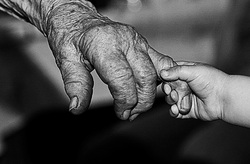 It has been nine years since my daddy died. Nine years! I can’t believe it sometimes. There are mornings when I will wake up and reach for the phone to call him and then realize – he’s gone. Oh, I know all of the things we tell ourselves. ”He’s not really gone. He still lives in you.” I hear the words, but the bottom line is, sometimes I just want a hug from him. Sometimes I want to hear his wisdom. Sometimes I don’t want to be the one who has to have the answers. I actually remember when Daddy was my age. I was a little girl. He seemed so much older and wiser than I feel at this same age. He wasn’t without fault, but when it came to my questions, he seemed to know everything. Daddy, why is the sky blue? Daddy, what does God’s voice sound like? Daddy, how far is it to the end of the universe? Of course, he didn’t have answers to questions like those, but he had a way of explaining things to my young childish mind that I was satisfied to not wonder anymore about things that were not easily explained – at least for a time. I fear that I do not have that same ability he had. Sometimes, my sons will turn to me for wisdom and insight and all I want to do is ask my daddy to tell me what to say to them. Sometimes I think about my future grandchildren and I wonder, what life lessons can I impart to them to help them become stronger – braver? I don’t know. And that scares me at times. I want to be their rock. I want to be their guiding hand. I pray that when that day comes, instinctively, I will know what to do and say. A few days ago I spoke to my Aunt Lenora on the phone, and she said she was the last living member of her side of the Jackson family. I heard within her voice the fear and the loneliness of being the last elder standing in a long line of amazing people. As the matriarch of our family, we expect Aunt Lenora to always be brave and fearless. We expect her to always be knowledgeable about every question we might have. Yet, we forget. Like the rest of us, she was a little girl once who looked up to the heroes and she-roes in our family. She ran around outside and played with her siblings and cousins. She sat in front of her mother, the woman we lovingly called Big Mama, and asked her all of the questions little girls ask their mamas. She ran behind her daddy, Daddy Red, and hung on to his every word. Now, she must be the elder of our family. I know at times it must be overwhelming to be the one everyone comes to for answers. My conversation with her allowed me to have a greater understanding of what it really means to be an elder. Elders are wise, but they are also vulnerable, just like the rest of us. We sometimes take for granted that when we reach some magical age we will be wise and ready to face anything life might send our way. But the older I get, the more I realize, we are all still just babes. Our hair might show white strands of wisdom, but when it is all said and done, no matter what our ages, we still crave someone to be just a little wiser than we are. We want those loving arms of someone older to wrap us up in an embrace that says, “Don’t worry. I’ve got you.” We want those things when we are seven and we want it when we are seventy-five. I miss those days when my daddy was able to solve all of my problems with a reassuring look and a full-on loving hug. I pray my children and grandchildren will feel that safety I always felt in my daddy’s embrace. I hope that, in me, they will find some of the same traits I found in the the elders who helped to raise me to be the woman I have become.
10 Comments
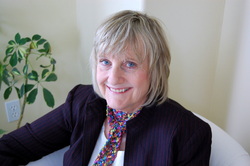 Karen Jones Gowen Karen Jones Gowen Full disclosure: Karen Jones Gowen is my editor at WiDo Publishing. Second full disclosure: Karen is the author of five books, including a cookbook. For those who know me, I do not cook with recipes. They intimidate me. Give me more than three ingredients and I am OVERWHELMED, not to mention, I am 95% vegetarian (I eat fish maybe once or twice a month, making me a pescetarian) so it isn’t always easy for me to find simple, delicious recipes without meat or meat products. However, Karen’s book, Farm Girl Country Cooking: Hearty Meals for the Active Family, did not intimidate me at all. Her recipes are wholesome and filling, and quite a few of them are already vegetarian based, like her recipe for Veggie Bake (It has only FOUR count them FOUR main ingredients, y’all!). But for all you meat lovers, fear not. There are plenty of great recipes for you, from what I’ve been told, like her Cajun Pot Roast and her Slow Cooker Boneless Pork Ribs. However, before we talk about Karen’s books and her publishing endeavors, let’s begin at the beginning. Karen Jones Gowen was born and raised in central Illinois, the daughter of a Methodist minister from Indiana and a school teacher from Nebraska. Karen has what one would call down-to-earth Midwestern roots. She attended Northern Illinois University in DeKalb and then transferred to the University of Illinois in Champaign–Urbana. After converting to Mormonism at the age of 20, Gowen transferred to Brigham Young University in Provo, UT, where she met her future husband, Bruce Gowen. She obtained her degree at BYU in English and American Literature. Karen and Bruce have lived in Utah, Illinois, California and Washington, currently residing near Salt Lake City. They are the parents of ten children. Not surprisingly, family relationships are a recurring theme in Gowen's writing. Karen, thank you for agreeing to do this interview. Let me just jump right in. There are so many amazing cookbooks on the market, what distinguishes Farm Girl Country Cooking: Hearty Meals for the Active Family from the rest? Farm Girl Country Cooking comes from years of planning menus and cooking for a large family, and from having to find recipes that feed a lot of hungry appetites without taking all my time and money. So many recipes now are too fancy and take too much time, plus using specialized ingredients that require extra cash. Teenage boys only care if a dish on the table tastes good and fills them up. And what I cared about was that they got a nice balance of vegetables and whole grains, with less meat, which is expensive. That’s why many of the recipes in my cookbook are easily adapted for vegetarians. We usually had three or four meatless meals each week. And I know how hard it is to decide what to make with what, as I still struggle with that when I need to make a dinner for more than just my husband and me. So I linked up main dish, side dishes and even dessert to give ideas to my readers. I experimented a lot before we went to press with what looked and tasted good together and what could work well when time was short. Did any of your recipes come from other sources besides your experimenting and having fun in the kitchen? Yes. I had so many recipes and meals that were part of our family history, you might say. Things my mother and grandmother had made that I’d used with my children, along with recipes I developed that were our family favorites. I wanted to combine them in one published cookbook, and in the process maybe help others who struggled to plan meals every night. Karen, let’s shift gears a little. I want my readers to know that you are a writer who wears multiple hats. My first introduction to your writing was through your fiction. So I wonder, of all of the writing you do, from fiction to cookbooks, is there one genre you enjoy better, and if so, which? I definitely prefer writing novels. Uncut Diamonds and House of Diamonds were both autobiographical novels, and then I did Lighting Candles in the Snow which was complete fiction. I felt like I’d crossed a threshold with Candles, as it dealt with addiction, a dysfunctional marriage and divorce—three things I thankfully had no personal experience with. I had to do research, and when readers who had dealt with these issues said it struck true to them, it made me feel like I had gotten it right. I’d love to write more novels about things I know nothing about, because it’s so rewarding to get into a completely different perspective. So, I have to ask. You have written Farm Girl, Uncut Diamonds, House of Diamonds, Lighting Candles in the Snow, and your cookbook, Farm Girl Country Cooking: Hearty Meals for the Healthy Family. Do you have a sixth book in mind? I’m currently working on a novel about a woman who experiences a traumatic experience at work and is subsequently paralyzed by fear. She has a drastic plan to overcome her fear but before she can implement it, she gets in a terrible accident that puts her in a coma. It is tentatively called “Waking Up,” due to be published next year. After that I want to write another in the Diamond series, which will be #3 in my Mormon family saga. Not sure of the title yet, although my husband says it should be called The Baseball Diamond. Haha! Not likely. I know the story behind how you got into the publishing industry has been fully discussed in your blog post called “The Truth about Farm Girl”; however, would you mind sharing just a little of that story with us? In my family, we like to say that while some publishing companies launch a book, in WiDo’s case, it was a book that launched a publishing company. That book was Farm Girl, a folklore history I wrote to honor my mother on her 90th birthday. I had no idea it would lead to the creation of a traditional book publishing company that has released 40 books. Karen, I teach full-time, write, and have a family, and most times, I’m overwhelmed by it all. How are you able to balance being a wife, mother, writer and business person? This is extremely difficult, because writing uses the creative side of one’s psyche while business uses the competitive, analytic side. However, I’d have to say that any writer today has to deal with this disconnect of the creative vs. the business. As writers we must promote ourselves and our books if we want to find readers in today’s hugely competitive market. Personally, I have to schedule my writing time and set weekly and monthly goals, or I’d never get any books of my own out. Your son William Gowen, is the CEO of WiDo Publishing, and your husband Bruce is the business manager, while you are managing editor. What is it like to work with your family? The first few years of WiDo’s existence consisted of numerous family members working together to implement this huge idea, along with the financial support of our generous and anonymous investor. Our son Don did the typesetting and covers; our daughter Liesel was an editor; William (we call him Billy) was an insightful decision-maker as well as an excellent editor; and other family was involved as well in various capacities. It wasn’t until early 2012 that we branched out from using only family, who really needed to devote more time to their own jobs and interests, to hiring freelancers. I have thoroughly enjoyed working with my husband and children to build something that has made so many writers’ dreams come true. Being a family of readers and book-fanatics, it’s incredibly rewarding that we have had this opportunity to publish so many wonderful books. What are some of your dreams for the future of the publishing house? Next year, 2014, we will reach the huge milestone of having published 50 books. It hardly seems possible since we went from 2007 – 2010 basically learning the ropes while publishing only a few books. We are forever grateful for the authors who took a chance on us early on, like William Everett Prusso (Ghost Waves, 2009), David J. West (Heroes of the Fallen, 2010), and Tamara Hart Heiner (Perilous, 2010). We barely knew what we were doing back then, yet these writers stuck with us during the extremely long editing and publishing process. Our time now from submissions to release is cut by about half what these good people had to endure. In addition, since 2009 the entire publishing industry has been going through a tremendous overhaul: from POD to ebooks to bookstores closing to the rise of self-publishing and of social media marketing. Many publishers, large and small, went out of business during that time, and I can hardly believe our little company survived it all and has even thrived. We are getting more submissions than ever and look forward to the 100 books released milestone. We see our immediate future being to continue the current pace of publishing an average of 12-15 books a year, supporting our authors along the way from editing to book release and beyond. Within the next five years, we’d like to double our yearly output to releasing 24-30 books a year. We also plan to integrate more aggressive online marketing campaigns for all of our books. At this moment, what type of authors are you seeking? We really love the enthusiastic authors who are excited about learning everything they can about navigating this great new world of online book marketing. In today’s bookselling world, it is the writer who is the face of the book. Readers could care less who the publisher is; instead, they’re often attracted to a book by who the author is. Writers can no longer stay in the background, quietly and anonymously writing. They’ve got to get out there and pull in their readership. It can be difficult since most writers are introverted, even reclusive, but the good news is that social media is the ideal vehicle for the reclusive writer to build a platform that also builds relationships with potential readers. For some of our authors, it comes easily and when they submit to us they have a solid platform already in place. For others, it’s brand new, with a definite learning curve until they can comfortably navigate social media. We like people willing to learn, to give their books the best chance of success by putting themselves out there, whether in person or online. And we will guide them and support and assist them along the way, because both publisher and author have the same goals: to put out a quality product that will attract readers and sales. We also like writers who are flexible and willing to work with their editors, willing to accept certain changes in their work or their ideas of what the cover or title should be in order to make the book more marketable. We try to be flexible too; because we want our authors to love their books as much when they’re published as they did when they finished the last draft and sent it off to submissions. What is one piece of advice you would give up-and-coming writers whose goal is to be a published author? Write, write and write some more. Write everything, not just books. Write like your life depended on it, because you won’t have a career as a writer if you don’t. You’ve got to love the whole idea and process of writing, despite the no money and the bad prose and the rejection and failure and discouragement. The more you write the better you will be, until one day you have the completed manuscript that someone outside your family and friends will love and want to invest in. Thank you, Karen. So readers, if you enjoyed reading about Karen and her many adventures in the publishing world, leave a comment and THE FIRST THREE people to leave a comment will receive an autographed copy of Karen’s book Farm Girl. If any of you readers or writers would like to learn more about WiDo publishing, click here. 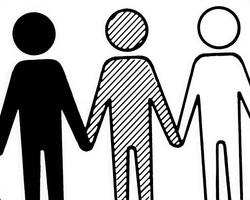 I am a child of the south. I have some very fond memories of growing up in the small town of Ariton, Alabama. I am a proud, southern writer and many of my family and friends reside there, so the south will always be home for me. But similar to Countee Cullen, in his poem, “Incident,” a great deal of my memories are clouded by the sting of racism. Perhaps the racism that hurt the most was from those “benevolent racist.” They were kind-acting. Wanted the best for everyone, even if it meant the continuation of segregation. In their minds, we all would be better off if we just kept things the way they were. But if you questioned them about their “attitudes,” they would insist that they “don't see color.” Many of their close friends, they would say, were “Colored, Negro, Black, African American, etc.” My short essay, “'Lost in 1993” is about my first day of college at Auburn University. As much as I knew I had overcome to get there, it took the actions of one student to spiral me downward into the rabbit hole of self-doubt. “Lost in 1993” is my story of falling, but it is also my story of getting back up. Lost in 1993 “Are you lost?” he asked, smiling, with an almost tender concern on his face as I stood hesitantly at the door of the classroom. I had followed the sound of lighthearted conversation and banter; sure that one of those self-assured unknowns would know where I was supposed to be in the next ten minutes. I entered the room. The room had tables and chairs arranged in an awkward circle and the view from this room on the 9th floor of the Haley Center was breathtaking. I could see Jordan Hare Stadium from the windows. I imagined my son and me there watching ballgames together. I sighed. This was my dream deferred and in spite of everything that had seemed to sidestep me from this dream through the years, I had finally made it! I smiled at the guy who stood there waiting for my response. I guess I was in such awe of actually being in the place I'd dreamed of for so long, that his questions flowed right through me without even registering in my psche. Plus, he had a Jesus-like look of patience on his face. Like if I never spoke, he would have still waited there looking welcoming and affirming. I was relieved for his concern. I had been circling the halls of the Haley Center for several minutes and I was afraid of being late for my first official graduate class. I had approached getting into Auburn University’s graduate school like I had approached everything else in my life—with grit, determination and the tenacity of a pit bull. I had secured grants, scholarships, housing and daycare for my son, so, the first day of class had been a long time coming, but in spite of, or maybe because of all that I had gone through to get there, I just knew I was about to live out my greatest dream. I reached out my hand to shake his. He seemed to hesitate for a moment. I even remember him looking at my hand in a strange manner, as if something was wrong with it, but before I could withdraw it, he grasped my hand firmly. "Hi," he said. "I'm *Court." Although concerned about being lost, my face could not contain its smile, particularly since the young man and his friends were behaving so friendly. I thought to myself, these are my fellow comrades and they are welcoming me. My smile threatened to split into halves, thirds, and into an unrecognizable mass of teeth and gums. "Hello," I said, shaking his hand firmly. Just like my daddy had taught me. Always look people in their eyes when you shake their hand, he had told me. The mark of an educated person is one who is not afraid to look a man straight in his eyes. I wanted to tell this smiling fellow that my first class was medieval literature and yes, I was lost. I wanted to tell him I liked Beowulf. I had read it in high school, and when I realized that we would be studying it in my graduate class, I pulled it out and reread it, making all of the intelligent sounding comments in the margins that I could think of. I wanted to be prepared. I wanted to tell him all of those things, share with him my excitement, but before I could say another word, he quantified his question; still, with the same benevolent smile he’d had from the beginning. “You know this section of the Haley Center is for graduate students? Right?” He sounded so innocent. But the alarm system that people of color possess that alerts us to the fact that we have just been hit with an invisible racist hand slap started chiming in my head. Like the loud, ominous sound of church bells. Instead of the words I know he spoke, I instead heard: You know this section of the Haley Center is for White’s only? Right? I think at that moment I dropped my eyes to the floor, and tried to regain the composure that had surely slithered off of me into a limp pile by my feet. To this day, Court does not know that his words took me back in time. If questioned about the incident, if he even remembered it, he would probably say he meant no harm. And you know, I would probably believe him. But it wouldn't change the sting I felt when he said it. In that moment, he violently tossed me into the rabbit hole that led back to the segregated south of my youth where I peed in Colored’s Only bathrooms and drank from my people’s very own personal drinking fountains that spewed out bitter streams of water. Slowly, I looked back up at Court again. He was still smiling. I studied him. He was dashingly handsome. Like a young Dean Martin or Clark Gable. But in that moment he became ugly. Like a steely-eyed Bull Conner ordering water hoses to knock down innocent, brown faces whose only crime was the desire to partake in civil disobedience. His few words stripped me of the advances Colored people had made and I was once again reminded me that I was The Other—the story that existed outside of the margin. Court was a benevolent racist. The kind who meant no harm. Later, he would "compliment" me by saying things like, "Well, one thing is for sure, Angela. You will always have a job" OR he'd say, still with a smile, "It's not easy getting a job if you are a white man." When he said things like that, I would find my anger rise up inside of me like the dry bones that came to life again in the biblical story. I had run out of compassion’s milk to offer to the ignorant lips of the Court’s of the world. I had run out of prayers of forgiveness for their lack of understanding of how their words were the matches that caused invisible crosses to burn. In that moment, I was no Jesus praying for his offenders. I was praying for that Old Testament God of vengeance to rear his head again and strike down those people like Court who continued to drape themselves in the covering of ignorance. But on that monumental day when Court asked me if I was lost, I realized something important. That day wasn’t just for me but it was for my grandparents, my dad and mother, Miss Eveline who used to give me Wrigley’s Spearmint gum during church services, my aunts and uncles and cousins, and all those elders from my home town, alive and dead, who never even got a chance to sit at the welcome table because they were too busy serving at it. Remembering that important fact allowed me to swallow hard and smile at Court and his merry band of men, and reply in a voice filled with confidence and pride,that even surprised my ears, “No, Court, I’m not lost. I’m where I belong. Would you mind helping me find my way?” *Name changed. 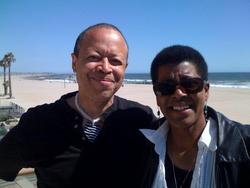 Authors Steven Barnes and Tananarive Due Tananarive Due (tuh-NAN-uh-reev DOO) is an American Book Award-winning author and the author, co-author and editor of over 15 books. She is the Cosby Chair in the Humanities at Spelman College in Atlanta, Georgia and currently, she and her husband, award winning science fiction writer, Steven Barnes, are producing a film based on their co-authored book, Devil’s Wake. 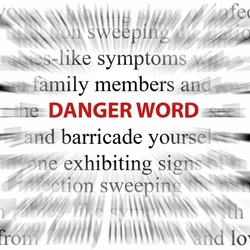 Short film based on the novel DEVIL'S WAKE. Thank you for agreeing to do this interview. I have made it no secret to my friends, family and strangers that you are one of my favorite writers, so I appreciate the opportunity to ask you a few questions. You’ve said in other interviews that you wanted to be a writer from the age of four. At what point did you make the decision that you wanted to write science fiction? I have written a bit of science fiction, but I see myself more as a dark fantasy or supernatural suspense (horror) writer rather than a science fiction writer. They are all in the family of speculative fiction; however, I remember being drawn to stories of space exploration and talking cats when I was a very young writer in elementary school. All children imagine stories of the fantastic, but it was hard for me to let them go when it was time to be a “grown-up” writer and take workshop courses at Northwestern University. My storytelling in the mimetic universe was very stale compared to my stories of the fantastic. For some reason, I become more deeply engaged in stories that are examining reality through the lens of metaphor. If we had the opportunity to eavesdrop on your writing process, what would it look like? What are your rituals and practices for creating your great stories? The most important element, perhaps, is music. I don’t always remember to listen to music when I need to write, but especially with a longer project like a novel or screenplay, nothing plunges me into “flow” state faster than a writing soundtrack. I create a specific soundtrack for almost every long piece of fiction I write. When I wrote Joplin’s Ghost, I listened obsessively to Joplin’s ragtime. When I wrote My Soul to Keep, I listened to a lot of early Louis Armstrong and world music. For post-apocalyptic zombie series, I prefer classic horror movie themes and epic, frightening themes and driving beats from musicians like Nine Inch Nails. Every long writing project has a music story behind it. It can be especially painful with screenplays, since I have yet to have a feature produced, so if I happen to hear a song from the soundtrack later, I might feel fresh disappointment. In what way has teaching writing to others helped or hindered your own writing? Aside from most writers’ innate desire to help pass on the lessons that helped them develop into professionals themselves, I find that hearing my own philosophies reinforced in a classroom situation can often translate to better habits in my writing life. I’m currently the Cosby Chair in the Humanities at Spelman College which has been a blessing. I wanted to take some time to breathe and concentrate on the work I have neglected. I found it difficult to spend time writing screenplays because of the financial pressure on my writing to create income, so I have been concentrating more on screenwriting and even filmmaking. That has been the big surprise to come out of teaching. I am also shifting more toward short fiction, exercising muscles that don’t get used in the same way in the world of a novel. In some ways, teaching has enabled me to feel like a student again. It isn’t easy balancing career and family, but you and your husband, Steven Barnes, seem to have found a method for making it work. What advice would you give others who want to be successful writers but don’t necessarily “see” how they can balance everything? I love being married to another writer, but I have learned that it’s very challenging to balance just the financial side in a two-artist home. Teaching has created more stability in our lives, and Steve has developed a great line of self-help and writing courses he sells online at www.diamondhour.com. So there’s that piece, and that’s a major piece—sources of income outside of the art. Raising a young son is another challenge, with serious time demands. All parents have to strike that balance of nurturing the marriage, nurturing the children and nurturing their careers…and perhaps writers have to also try a bit harder not to let their eyes glaze over in a faraway land while their children are present. “Balance” is a series of course corrections, much more a journey than a destination. And at the core of that is the nurturing of self—diet, exercise, meditation—that often gets forgotten. I was recently at a women’s empowerment luncheon in Atlanta, and a speaker made a great point that we can’t forget to nurture our girlfriends too because they are there to help us navigate the more difficult times. That’s why it’s an unexpected thrill to find myself working with both my husband and best friend on a short film, since it’s a project in common that gives us plenty of excuses to exchange ideas and talk to each other. You and Steven Barnes have collaborated on numerous novels (the award-winning Tennyson Hardwick mystery series and now Devil’s Wake and its sequel, Domino Falls), and you have said that the two of you have developed a writing strategy that involves one of you writing the first draft rather than you writing collectively. How did the two of you decide to adopt that practice for co-writing? Having worked in Hollywood and co-authored novels with science fiction greats Larry Niven and Jerry Pournelle, Steve has been a collaborator for much of his career. I was new to collaboration. I never would have conceived of a process where two writers are virtually side-by-side as they work, and Steve introduced his collaborative practices with other novelists to ours. I take first draft in the Tennyson Hardwick series we write in collaboration with Blair Underwood; Steve takes the first draft in our YA zombie series, which is a blend of science fiction and horror. Another rule Steve taught me: someone always has to have the final say, and generally it’s the writer who takes lead on the first draft. In an interview with Lit Stack, you mention that Devil’s Wake was born out of a short story you wrote with Barnes. Do you have any other works that started out as short fiction but evolved into a longer work? Actually, yes—my second novel, My Soul to Keep, evolved from both a poem I wrote in high school called “The Eternal Man” and a short story I wrote later called “The Anniversary,” about a woman whose husband leaves her without explanation after ten years—but he has never aged, never gotten sick. Recently you announced you and Barnes would be working with director Luchina Fisher to produce a short horror film, Danger Word, based on the novel Devil’s Wake. Why did you and Barnes decide to take on this huge undertaking without the financial backing of anyone other than yourselves, friends, family and fans? I could write a dissertation on why we’re co-producing Danger Word, but I’ll distill it to the practical: I’ve had film inquiries about my novels since my first book was published in 1995, Steve and I have sold three drafts of a screenplay to a studio, and we have both had works fall in and out of option. The bottom line is, we want to live to see our work produced. I know too many writers, including Octavia Butler, who never lived to see it—and we both love film, so it’s an important milestone to us. Beyond that, I want to be an example to other writers, actors or would-be producers who are sitting on the fence and believe it’s too difficult to be a filmmaker. So many artists opened my eyes to the possibilities in independent and short films--Ava DuVernay (I Will Follow, Middle of Nowhere) and emerging artists like Bree Newsome (Wake) and Keith Josef Adkins (The Abandon—a web series pilot). And I can’t forget the influence of Luchina’s short film in 2011, Death in the Family, which also truly inspired me. Once you see a string of others walking across the tightrope, you believe you might be able to walk up there too. Lastly, I know the impact of film and television. I remember watching Diahann Carroll as “Julia” and being fascinated by her son, Corey, who might have been the first black child I saw on TV. I remember how special it was when my family gathered to watch The Cosby Show, and how breathtaking Star Wars was. Those images are important nutrients. Danger Word is a zombie film on the surface, but I look forward to creating a visual blueprint that will help teach our girls to be strong. If readers would like to support the making of Danger Word, what can they do? What are some of the incentives for donating (other than supporting an amazing short film)? Our first fundraising deadline is May 25, when our projected shoot begins, so it’s a huge help just to pass the word and subscribe to our website: www.dangerwordfilm.com. We also have a Facebook page and a Twitter page: @ZombiesFreak on Twitter. But the bottom line is, we have a little over $5,100, and our production goal is $15,000. That’s a long way yet to climb. We’ve learned a great deal after observing Kickstarter and Indiegogo campaigns, and as a donor to other projects, I know how important it is for donors to feel recognized. We offer social media shout-outs, website listings, T-shirts, digital downloads, DVDs, a chance to be a zombie—all the way to a genuine producer credit on IMDb.com. Thank you Tananarive Due. Good luck with the film and all of your upcoming ventures. Thank you! 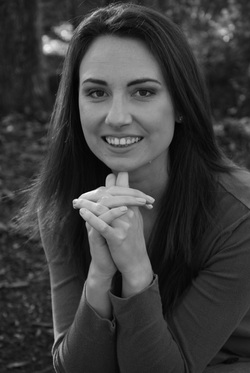 WiDo Publishing author, Jadie Jones, has recently released her first novel entitled Moonlit. Jadie lives with her family in the foothills of North Georgia. She has a degree in equine business management from St. Andrews University, and she is currently training horses, coaching several competitive riding teams, and working hard on the next installment of her series, featuring her spunky and charming main character, Tanzy Hightower. 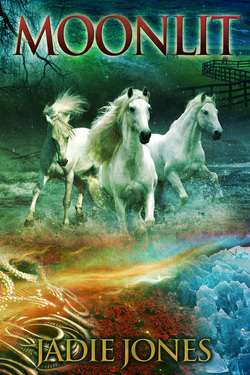 Story Synopsis Eighteen-year-old Tanzy Hightower knows horses, has grown up with them on Wildwood Farm. She also knows not to venture beyond the trees that line the pasture. Things happen out there that cannot be explained. Or undone. Worse, no one but she and the horses can see what lurks in the shadows of the woods. When a moonlit ride turns into a terrifying chase, Tanzy is left to question everything, from the freak accident that killed her father to the very blood in her veins. Broken and confused, she turns to Lucas, a scarred, beautiful stranger, and to Vanessa, a charming new friend who has everything Tanzy doesn’t. The question then becomes, why do they seem to know more about her than she knows herself? INTERVIEW Hello, Jadie. Thank you for doing this interview with me. One thing I always wonder about fellow authors is do they have specific writing “ritual” to get them into the mindset to write. Do you have any such rituals? Thanks, Angela. I really like to have a cup of hot tea within an arm’s reach, especially during drafting. I also work best in stretchy pants. Seriously. I lean forward a lot when I write and wearing real pants just won’t do. I also like to have an empty picture frame somewhere near my computer. I got the idea from a piece of writing advice Anne Lamott gives in her book Bird by Bird. This ritual helps me focus if I get stuck. Jadie, it is clear that you are a talented young writer. You write with a confidence not often seen in newly published writers. I’m just curious; who are some of your favorite writers? Amy Greene, Walter Farley, and Anne Lamott, to name a few off the top of my head. When a writer’s voice comes from an honest, simple place, I fall in love and will follow them anywhere. Of course the question everyone wants to know the answer to is where did you get the idea for your novel, Moonlit? I took a head-dive off of a horse and wound up with a pretty good concussion. When I went to sleep that night, I dreamt of an underground chamber in ancient Egypt where a band of dark headed girls was guarded by burly, half-dressed men. I had the distinct impression that the girls made the guards very nervous, and then one of the girls turned and looked straight through me, as if to say: tell our story. I started penning the first draft that afternoon. What part of the novel came to you first – the characters or the plot? The character has been a voice in my mind for a long time. It just took me a while to find a journey she’d agree to take. And then I had to figure out how to get my down-home farm girl to ancient Egypt… The question authors are always asked is how much do certain characters resemble them, so I will ask the question of you…how much of Tanzy, your novel’s protagonist, is you (if any part)? The horse-girl aspect is something I draw from personal experience. I started working at a horse farm when I was twelve, cleaning tack and scrubbing buckets, etc. Once I turned sixteen and could drive myself, it was not uncommon for me to be out there alone either blanketing horses on cold nights, or checking on a sick horse. I also liked to arrive before anyone else because I enjoyed the quiet and could get more done. Predawn at a barn is the most peaceful place on earth. I’m also admittedly headstrong and can react before I think something through. Those traits show up in Tanzy as well. Now that I have finished reading Moonlit, I am ready for book two of your trilogy. How far into the writing process are you with the other two books? I am currently editing the sequel in hope to submit it to WiDo Publishing in May. I’m still unearthing some key factors in the sequel. They make themselves known to me only once they’re sure I’ll know what to do with them. I know what I want to accomplish with the third and final book, but I’ve learned to stay very open minded and flexible when it comes to Tanzy Hightower. She’s a force of nature. Well, Jadie, I wish you much success on this day—YOUR BOOK RELEASE DAY. I am sure that Moonlit will have a tremendous amount of success. I look forward to reading all of your work to come. If you would like to learn more about Jadie Jones, please meander over to her website. Click here. 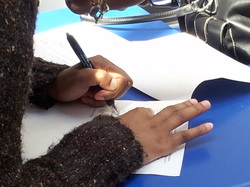 The picture to the left is of me signing my book contract with WiDo Publishing. Oh. What. A. Feeling. To read more about my dream come true, click here. A few posts ago, I encouraged writers to read their work. There is something so scrumptious about tasting the words of your characters in your mouth. You become the conduit through which they are heard and felt. I have always loved performance art. Perhaps, if I didn't have such difficulty memorizing dialogue/lines, I would have auditioned for the stage. Maybe the fact that memorization is a chore for me, I instead focus on getting the voices of my characters just right. I know I will never perform in a play (unless I am the character who enters stage left, nods at the people in the audience, and then walks off stage right). Therefore, I must allow my creative process to help me engage my characters orally. My ultimate goal is, after I've "written" and "talked" my characters into existence, someone who reads a story written by me will "hear" the voices of the characters as if I or the character herself were speaking them out loud. So, below, I share with you my reading of my short story, "Something in the Wash." This story is part of the thesis I wrote entitled Wade in the Water. Please feel free to leave comments below about your writing/reading experiences, or just talk about writing with me.  “Writing is a socially acceptable form of schizophrenia.” ~ E. L. Doctorow Because I was raised as an only child, hearing voices was a normal occurrence for me. Before I could even read, I invented elaborate stories about my stuffed animals, my imaginary friends, and myself. And no matter what the story, I always had a particular voice for each stuffed bear, each long-legged Barbie and each imaginary prince who was coming to sweep me—his little brown-skinned Princess—away to some fairy kingdom. And when I wasn’t creating my own voices, I would often times sit (well hidden so as not to be seen or disturb the storyteller) and listen to my Dad and his brothers and friends tell elaborate stories about people they knew, and always, always their stories were accompanied by the voices of the person they happened to be talking about. And as a result, these people became more than words out of the storytellers’ mouths, they became living, breathing people who embodied the very soul of the oracle relating the story. As a result of my “voice-filled” childhood, it became second nature for me to hear the voices of the characters that I would create in my own writing. And until I heard them, until I could hear each character’s individual personality radiate through every word of dialogue, until I heard the very timbre of their voices, my characters did not exist for me. The voices in your story are the DNA makeup of your characters. The voices are what makes your characters tick. I like knowing all sorts of details about my characters. Things like: Date of birth. Time of birth. Place of birth. Parents names and ages. Siblings names and ages. Etc. I also like to SPEAK OUT LOUD the dialogue of my characters. Speaking out loud is so very important for developing the voice of each character. If you hear your characters, then you can more easily catch when you’ve written dialogue or action that doesn’t fit with your characters. So, ask yourself: Does your character speak fast? Slow? Does she stutter when she’s nervous? Does she have a drawl or does she speak with the clipped cadence of a Northerner? Walk around. Embody your character – mind, spirit and soul. Ask questions that will allow you to get as deep into the psyche of your character as you can because there is where voice resides. So here are some potential questions you can ask your character during a pre-writing interview. And really act this out. BE the character. Not the writer. Not the reviser/editor. But the actual character from your story. Some of the potential questions you can ask are: Question 1: What is your earliest memory? Question 2: Which of your parents showed you the most love? In what way? Question 3: What type of people did you hang out with in high school? Question 4: Who was your first sexual partner? Did you enjoy it or not? Question 5: What is the worst thing you ever did to a person that you loved? Question 6: What is the worst thing that was ever done to you by someone you thought loved you? Question 7: How would your family and friends describe you? Question 8: What is something that you have done or said that you wouldn’t want your mother, father, spouse, and/or children to know about? Question 9: Are you living your best life? If not, why not? Question 10: What is the most interesting thing that has ever happened to you? Question 11: What is your most pressing need right now and what would you do to get it? 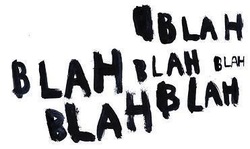 As much as I adore writing, there are days when I feel too blah to do it. I’ll have great characters, an amazing plot, and a clear direction on how I will marry the two together, but the blahs take over. So, I came to realize that preparing to write has to become as important as the actual writing sometimes. So, here are some tips that can help writers avoid the writing blahs. 1. Take a walk or do some yoga before you start writing. Get yourself in the right head space. 2. After your walk or yoga, take a shower/bath and spritz yourself with your favorite cologne/perfume. Put on something nice AND comfortable. Treat writing like it is a date you are about to go on. 3. Set aside two times a day to write. That way, if you miss the first time, you won’t beat yourself up because you know that there is still another time slot available. A groovy plus that can happen is – you write during BOTH time slots. If you can do that a few times per week, well, you will really feel good about yourself. 4. Reward yourself if you accomplish your weekly goal. Now, I’m not saying go out and buy yourself some Prada every time you write 750 words, but I am suggesting that you go buy yourself a nice Gourmet Cupcake if you keep your writing goal for a whole week. Or go Goodwill Hunting or Consignment shopping in the fancy side of town and see if you can find that jacket that would normally sell for $75 for a huge sigh inducing $9. 5. Create a writing retreat in your writing space. Buy nice candles and a miniature waterfall that sits on your desk. Splurge (even if you must save for months) and buy a nice, comfy chair. Go to a supply store and buy all of the cool pencils, pens, folders, highlighters, Post-its, etc. that make your desk look ready for creating. Make sure your lighting is perfect, and for goodness sake, make sure that you are not sharing that space with someone else. If it is shared space, try to make appointments for the space so that you aren’t in the space at the same time as someone else. 6. Finally, at the end of the day, return the space to its previous order. Don’t leave it messy. That way, when you go there the next day, it will still be inviting and enticing. |
Archives
March 2021
Categories
All
Blog Roll
|
 RSS Feed
RSS Feed







